| Decline And Fall Of The Pakistan Hockey Empire |
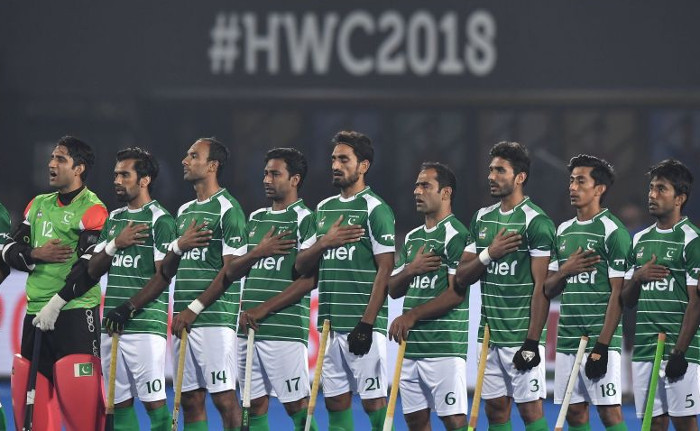
Article by Aamir Latif, courtesy Anadolu Agency
 ockey
legend Samiullah Khan recalled a cold but shining morning in January 1982
when he, along with other players of Pakistan's national hockey squad landed
at Karachi airport. Pakistan won the glittering World Cup trophy, beating
West Germany 3-1 in the final in Bombay (now Mumbai). ockey
legend Samiullah Khan recalled a cold but shining morning in January 1982
when he, along with other players of Pakistan's national hockey squad landed
at Karachi airport. Pakistan won the glittering World Cup trophy, beating
West Germany 3-1 in the final in Bombay (now Mumbai).
As soon as the champions emerged from the lounge, thousands of
exuberant hockey lovers chanted "Pakistan Zindabad", or Long Live
Pakistan, showering them with rose petals and placing garlands around
their necks.
Some of the elated sports lovers hoisted the players on their
shoulders and the security officials had to struggle to make way for the
team to hop on their bus.
"Those moments are unforgettable. That was the golden era of hockey
when hockey would run in the nation's blood," said Samiullah, also known
as 'The Flying Horse' because of his great speed.
To the surprise of many, hockey is the national sport of an otherwise
cricket-obsessed nation. Pakistan has won three Olympic gold medals,
four World Cups, four Champions Trophy tournaments and eight Asian Games
hockey golds.
But the sport for which the country was world-renowned is now a
picture of apathy. Spectator-less stadiums, declining numbers of players
and a virtual media blackout are enough proof that the nation has lost
interest in the sport.
The country has slid to 17th place in the world hockey ranking.
Several teams which were trained and coached by Pakistani players,
including China, South Korea, Japan and Malaysia, are ahead of Pakistan
in the world ranking.
"It's painful to see the current hockey situation. But this has not
happened all of a sudden. It's a gradual decline," said Hanif Khan,
another hockey star who was part of the national squad that won several
titles from 1976 to 1985.
Samiullah vindicated Hanif Khan's view. "Apart from political
intervention, Pakistan could not meet the latest infrastructure
standards, which ultimately affected the team's performance but also
reduced youths' interest in the sport," he observed.
Until 1990, Pakistan had only four AstroTurf grounds compared to the
Netherlands, which has over 200 of them. Only 40 hockey clubs are active
in Pakistan, according to Samiullah.
Both Khan and Samiullah see 'over-glamorization' of cricket as
another key reason behind the shift of youth's and sponsors' focus from
hockey. "There is much more money, glamour and recognition in cricket
compared to hockey. That's why more and more youths are inclined towards
cricket," Samiullah said.
He cited the example of a former national hockey team captain,
Zeeshan Ashraf, who worked as a part-time cashier at a government bank,
whereas many former and current cricketers are working as
vice-presidents and at other high-profile positions in public and
private sector organizations.
Until 1990, Pakistan had over a dozen departmental teams. But
gradually, both state-run and private institutions started disbanding
their teams due to financial constraints and the country's dwindling
ranking at the international level. Job quotas for almost all sports
except cricket have been significantly reduced in public and private
sector organizations in recent decades.
"If there is no money, no job and no recognition, then what's the
attraction for youths to pick hockey?" Khan said.
Scenes during the ongoing national hockey championship at Abdul
Sattar Edhi Hockey Stadium in Karachi further exposed Pakistan Hockey
Federation's so-called efforts for the sport.
Several players were crammed into small halls and rooms with their
clothes and kits hanging above them from the walls. Some players queued
up outside the grounds to fetch water from a cooler after spending a
sleepless night due to a power outage in the sultry weather.
"What kind of performance do you expect from us if we couldn't sleep
the whole night?" said a player participating in the Nationals. "Look at
the conditions and facilities here first, and then expect us to compete
at the international level," he signs off.
|
| Gurbux Singh's 'My Golden Days' Is A Great Read |

Article by Ijaz Chaudhry courtesy SportsCorrespondent.info
 sportsman's
biography contributes to the history of the sport in that era and 'My Golden Days' is definitely one
in that regard. A true star of his time, Gurbux Singh, 1964 Olympic and
1966 Asian Games gold medallist, has come out with a beautifully penned
down autobiography. sportsman's
biography contributes to the history of the sport in that era and 'My Golden Days' is definitely one
in that regard. A true star of his time, Gurbux Singh, 1964 Olympic and
1966 Asian Games gold medallist, has come out with a beautifully penned
down autobiography.
The tall bespectacled Sikh was probably the only player on the
international hockey circuit during his time who wore glasses. The very
first chapter is titled 'In Praise of Spectacles', where his own
experience playing with the glasses plus people's reactions on seeing a
bespectacled hockey player in action are given.
The next chapter is about his most memorable day, the final of the
1964 Olympics, when India defeated Pakistan to regain the Olympic gold.
After the first two chapters, the content flows chronologically.
Born in 1935, Gurbux comes from a family living in the Potohar area
of Punjab (now in Pakistan). As a child, he witnessed the Partition
riots of 1947 before the family crossed the newly created border to
settle in what is now India.
The Punjabi started his serious hockey in Lucknow, and later settled
in Kolkata, where he is now living for over six decades. A chapter is
dedicated to his beloved city, where all his five children were born.
Apart from the two Olympics where he played (1964, 1968), Gurbux
attended four other Olympics in different roles: member of the media
(1972 Olympics), Indian hockey coach (1976 Olympics), television
commentator (1996 Olympics) and as a spectator (2000 Olympics) - he
shares memories from all these events.
The 1968 Olympics saw a bizarre arrangement where the Indian team had
two 'joint' captains in Prithipal Singh and Gurbux Singh. The background
is fully explained. Favourites India, the reigning Olympics and Asian
Champions, failed to reach the Olympics final for the first time, and
ended with a bronze at the 1968 Olympics.
Gurbux writes, "with the bronze in our bag, we had to return home
quietly, faces hidden in disappointment, heads lowered in shame." The
1968 Olympics was his swansong - Gurbux never played for India again.
As coach of the Indian team for the 1976 Olympics, Gurbux faced
humiliation again. Favourites India, the reigning World Champions,
failed to reach the Olympics semi-finals for the first time, and ended a
disastrous 7th. Gurbux had to appear before a parliamentary committee.
One chapter has tributes to the players Gurbux admired, not only his
contemporaries but also from the early and following eras. As many as
three pages are reserved for Dhyan Chand; the greatest of them all.
The book has a number of fascinating anecdotes. Gurbux was the
manager of the Indian team for the 1983 Champions Trophy in Karachi. On
their way back, on Gurbux's request at the farewell dinner, the
President of Pakistan, General Zia ul Haq arranged a visit of Sikh
players to Nanakana Sahib, a holy place for the Sikhs near Lahore.
The General is quoted in Punjabi, "Gurbuxji, adha suwab toheda te
adha suwab mera", meaning half the blessings for you and half the
blessings for me.
There are forewords by Indian cricket legend Bishan Bedi and hockey
great Keshav Dutt, the double Olympic gold medallist.
The book has a coffee table book design, with pictures in almost
every page (total 232 pages), including a number of full page pictures.
"My Golden Days" is a wonderful read for any sports buff, not just
hockey lovers.
|
| Devindar Valmeeki And Harjeet Singh To Play For HGC In Euro Hockey League |
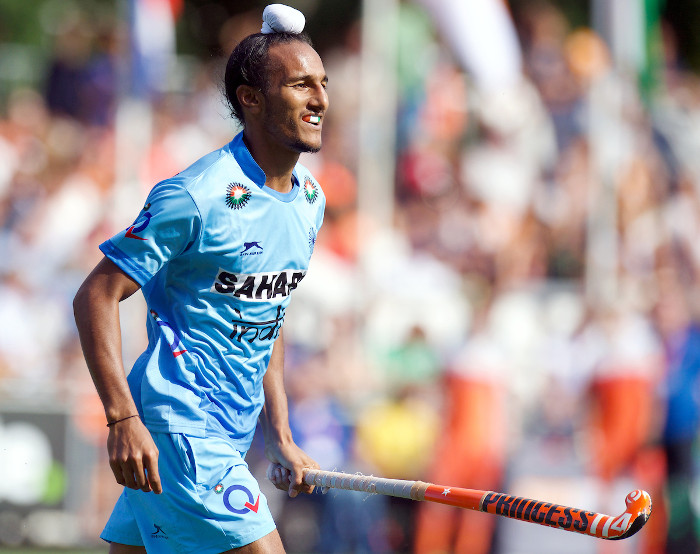
Photograph credit Frank Uijlenbroek of
World Sport Pics
 OC
Gazellen-Combinatie, also known as HGC, have signed a pair of Indian
internationals to their line-up for the upcoming 2019/20 season -
attacking midfielder Devindar Walmiki and defender Harjeet Singh. OC
Gazellen-Combinatie, also known as HGC, have signed a pair of Indian
internationals to their line-up for the upcoming 2019/20 season -
attacking midfielder Devindar Walmiki and defender Harjeet Singh.
Devindar Valmeeki, 27, was part of the Indian selection for the Rio
Olympics in 2016 and also played in the German hockey league in 2017. He
has 48 caps for India.
Harjeet, 23, was captain of the Indian side that won the Junior World
Cup in 2016. He has 52 caps for the national side.
HGC, coached by Paul van Ass, competes in the highest level of the
Dutch hockey league, 'Hoofdklasse'.
van Ass is a former coach of the Indian national team. He was
appointed in 2015 on a three-year contract but was forced out within
months after a bitter public spat with the then Hockey India President
Narinder Batra. van Ass had stated that he was fired from the job for
coming in the way of Batra berating players for their performance after
a match.
HGC is making a return to the EHL for the first time since winning
the title in 2011. Both Devindar and Harjeet will be participating in
the EHL KO16 event to Barcelona in October.
HGC is based in Wassenaar, located on the western coast of the
Netherlands, 10 kms north of The Hague. The club is more than a century
old, having been founded in 1906.
|
| Long-Term Big-Stadium Partnership Between England Hockey and the Stoop |
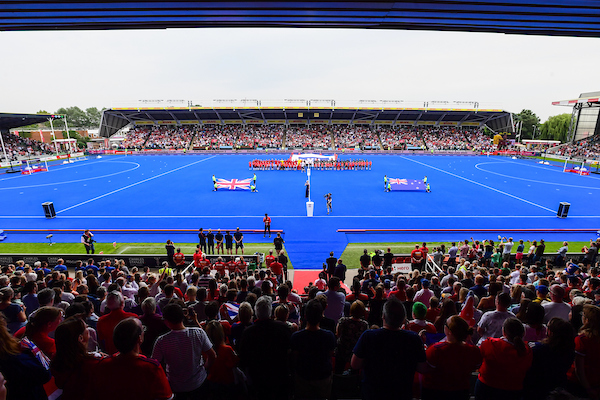
Based on articles by Rod Gilmour, courtesy The Hockey
Paper, Photo credit WorldSportPics
 round
12,000 fans were at the ground for the ground-breaking Great Britain vs.
New Zealand double header at The Stoop - and the signs are positive for
staging more big internationals at the venue. round
12,000 fans were at the ground for the ground-breaking Great Britain vs.
New Zealand double header at The Stoop - and the signs are positive for
staging more big internationals at the venue.
Ola Obaro, strategic lead of the Harlequins rugby club that owns The
Stoop, told The Hockey Paper that the pitch technology, coupled with the
similarity between the rugby and hockey audiences, bode well for future
partnerships.
"We entered into our relationship with England Hockey with a
long-term view. It was never a partnership to deliver just two matches,"
said Obaro. "When conversations started, it was clear that England
Hockey wanted to grasp the potential with the local community, the clubs
within the catchment area and the overlap with the rugby club."
The Stoop is currently in planning stages for a ground redevelopment.
Obaro said: "What we are doing is learning about the technology and the
build timings, and look to reduce the timings and be able to go from
rugby to hockey and back, and other elements like branding, which will
be digitally-enabled at the press of button."
In the modern sporting landscape, staying as relevant as possible
is also firmly in Harlequins' remit. "The potential of hockey is huge
and is a great live sport to watch," said Obaro. "The view with the blue
pitch feels almost at home within our stadium, so the potential from an
exposure and broadcast point of view is massive."
And with the newly introduced Pro League acting as a continuing
hockey story line between the World Cup and Olympic cycles, it is one
Harlequins and England Hockey are clearly keen to develop.
"We are passionate about helping England Hockey reach their aims and
goals, and we are proud to be a part of it," concluded Obaro.
These truly are heady days for hockey. But when the domestic season
kicks off, we will revert back to sparse crowds and the bald facts that
the Premier Division is secondary in support, coverage and a desire to
support our elite teams.
There is a disparity between the international and domestic
audiences, with hundreds of families, young boys and girls, attending
England and GB games across the country who would give the domestic
season a cursory glance.
The Stoop may have been a double-header the like never seen before in
the UK. But it has also ushered in questions on the sport's future away
from the international game. One that hockey should not shy away from.
|
| Hockey Players Are Contingent Flag Bearers At Pan Am Games |
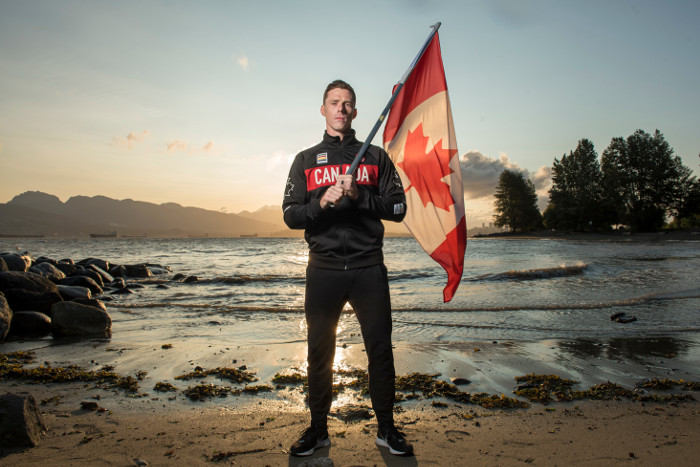
Canadian contingent flagbearer Scott Tupper, photograph courtesy Christopher Morris/COC
 he Canadian Olympic Committee (COC) has named Scott Tupper as Team
Canada's flag bearer at the Opening Ceremony of the 2019 Pan American Games at Lima. He will lead
a delegation of 477 athletes and 119 coaches into Estadio Nacional del Peru on Friday, July 26. he Canadian Olympic Committee (COC) has named Scott Tupper as Team
Canada's flag bearer at the Opening Ceremony of the 2019 Pan American Games at Lima. He will lead
a delegation of 477 athletes and 119 coaches into Estadio Nacional del Peru on Friday, July 26.
Said Scott, "I am very proud and feel privileged to have this honour. While it's an individual
distinction, it's indicative of our hockey team's past success. I am
looking forward to representing our program and our country at the Opening Ceremony."
Among his hockey achievements, Tupper is a two-time Olympian
(Beijing 2008, Rio 2016) and three-time Pan American Games medallist (2007
gold, 2011 silver, 2015 silver). Over his 14 years as a member of
Canada's national field hockey team, he has been captain for eight
years. Scott recently hit the 300 cap milestone during Canada's test
series against Japan.
Tupper coaches at the club, academy and junior national levels in Canada. In
2018, he was appointed to the FIH's Athletes' Committee.
Also, hockey player Kathleen Sharkey will be Team USA's flag bearer
for the Opening Ceremony of the 2019 Pan American Games. She was chosen
to receive the honor by fellow Team USA contingent members.
Kathleen was a member of the 2016 US Olympic team which finished 5th.
She won gold at the 2014 Champions Challenge and 2017 Hockey World
League Semifinals. Kathleen is the first field hockey athlete to serve
as flag bearer for Team USA at the Pan American Games.
The 2019 Pan American Games will take place from July 26-Aug. 11 in
Lima, and will feature 6,700 athletes participating in 39 sports.
|
| Photograph of the Month |
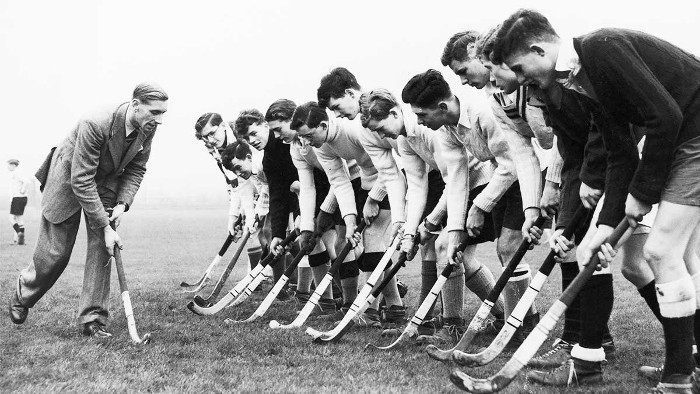
Vintage hockey photograph - source unknown
 he
Photograph of the Month for August 2019 is a vintage photograph probably
taken at a boarding school, perhaps in England, back in the days when
school coaches used to be formally dressed. he
Photograph of the Month for August 2019 is a vintage photograph probably
taken at a boarding school, perhaps in England, back in the days when
school coaches used to be formally dressed.
The source of the photograph is unknown - file this under The Romance
of Hockey.
|
| Money Matters |
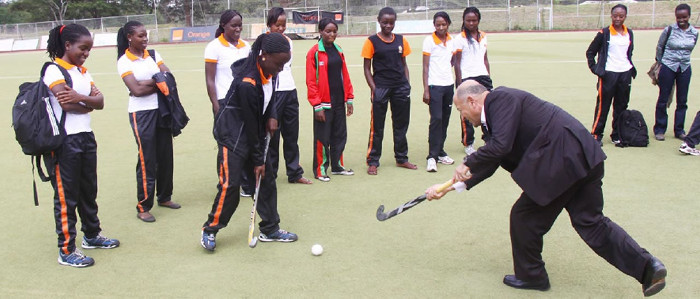
Article and Photograph of Telkom Orange CEO Mickael Ghossein credit
Daily Nation
 leading telecommunications firm in
Kenya, Telkom Kenya, has halted their 30-year sponsorship of the women's hockey club, Telkom. The move will have a far-reaching effect on women's hockey
in Kenya, and brings to the fore the difficulties most local clubs have been going
through for years. leading telecommunications firm in
Kenya, Telkom Kenya, has halted their 30-year sponsorship of the women's hockey club, Telkom. The move will have a far-reaching effect on women's hockey
in Kenya, and brings to the fore the difficulties most local clubs have been going
through for years.
Telkom, which was formed in 1989, has won 10 Africa Cup titles for
clubs and 21 domestic league titles - a feat unrivalled not just in
Kenya, but also in the continent. 90 per cent of the players
in the national women's hockey team come from Telkom Kenya.
It was the sponsorship of Telkom Kenya that secured training grounds
for the players, gave them allowances and gave them ample time to train. That is going to take
a hit immediately. Hockey standards are bound to plummet, and Telkom could find
itself unable to match the rest in the continent.
The club is now on the lookout for sponsorship, and will join many other
self-supporting clubs that have struggled to keep afloat owing to lack
of funding.
But it is not only the clubs; their parent body, Kenya Hockey Union
(KHU), has been struggling to get sponsorship for their programmes,
especially the national leagues, for many decades.
Telkom's woes should be a big lesson to not only clubs, but also KHU
on the need for serious marketing tactics for sustainable sources of income.
Hockey is a popular sport, from the school to club level. Players coming through
the system need to have hope that there is a
future in hockey, and that they can actually derive a livelihood from it.
|
| Media Matters |
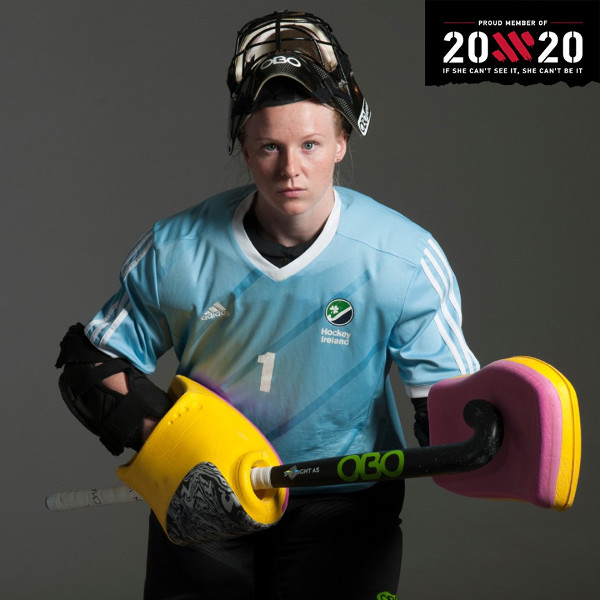
Photograph courtesy Hockey Ireland
 oasting the tagline 'If she can't see it, she can't be it' the 20x20
campaign is an inclusive moment to shift the perception of women's sport
in Ireland by the year 2020. This involves 20% more
participation, 20% more media coverage and 20% more
attendance at women's sporting events in the space of one year. oasting the tagline 'If she can't see it, she can't be it' the 20x20
campaign is an inclusive moment to shift the perception of women's sport
in Ireland by the year 2020. This involves 20% more
participation, 20% more media coverage and 20% more
attendance at women's sporting events in the space of one year.
The campaign, backed by the Federation of Irish Sport, is
co-sponsored by AIG, Investec, KPMG, Three and Lidl. The campaign was
launched at Google's Dublin headquarters. The launch video featured a
number of young girls struggling to name any female role models in sport
because of the lack of media coverage.
The campaign will
have a heavy social media presence and will ask people to pledge one
action to show their support for women's sport in Ireland.
Graham Shaw the coach of the Irish women's hockey team that reached
the World Cup final, was present at the launch. This was his take on attitudes
to women's sport in the country.
"I was out the other evening and two lads asked me 'When are you
going to do the men's job?' I looked at them like, 'What?' The
Irish women just won a silver medal in the Hockey World Cup. This is the team that we can take to the next
level.' That's the mindset we need to bring about."
|
| Visitor of the Month |
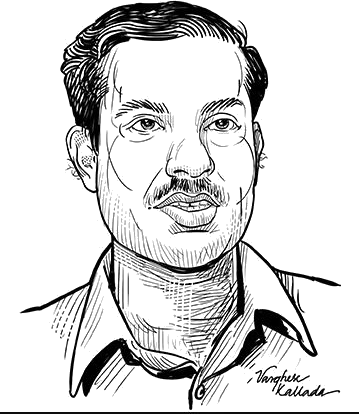
 he
August 2019 Visitor of the Month is Hasyim Jumadi from Singapore. Hasyim sent the following email to BharatiyaHockey.org: he
August 2019 Visitor of the Month is Hasyim Jumadi from Singapore. Hasyim sent the following email to BharatiyaHockey.org:
I am looking for my ex-teammate, Mohammad Riaz. I used to. play
together with him for the Hougange Hockey Club in Singapore. How can
I communicate with him? Thank you.
|
| Fun With Numbers |

Statistics by B. G. Joshi
 he
August 2019 edition of Fun with Numbers is on the EuroHockey Championships
(men, women), which will be held in Antwerp, Belgium, from August 16-25, 2019. he
August 2019 edition of Fun with Numbers is on the EuroHockey Championships
(men, women), which will be held in Antwerp, Belgium, from August 16-25, 2019.
MEN'S EUROHOCKEY CHAMPIONSHIP
- Germany, Netherlands, Spain and England are the only countries to have
participated in all 16 editions of the EuroHockey Championship
- Germany, Netherlands, Spain and England are the only countries to have
won gold in the EuroHockey Championship
- Germany has won the most consecutive golds in the EuroHockey
Championship, winning a sequence of 4 titles in 1991, 1995, 1999 and 2003
- The countries with just a solitary appearance in the EuroHockey
Championship include Belarus, Gibralter, Hungary, Malta, Portugal
and Yugoslavia
- *The records of West Germany are included in Germany's records;
the records of Soviet Union are included in Russia's records
| Country |
World Rank |
Appearances |
Gold |
Silver |
Bronze |
| Germany* |
7 |
16 |
8 |
3 |
3 |
| Netherlands |
3 |
16 |
5 |
7 |
3 |
| Spain |
9 |
16 |
2 |
2 |
1 |
| England |
6 |
16 |
1 |
1 |
7 |
| Belgium |
2 |
15 |
|
2 |
1 |
| Ireland |
11 |
14 |
|
|
1 |
| Russia* |
23 |
|
|
1 |
|
WOMEN'S EUROHOCKEY CHAMPIONSHIP
- Netherlands, Germany, England and Spain are the only countries to have
participated in all 13 editions of the EuroHockey Championship
- Netherlands, Germany and England are the only countries to have
won gold in the EuroHockey Championship
- Netherlands has won the most consecutive golds in the EuroHockey
Championship, winning a sequence of 4 titles in 1995, 1999, 2003 and 2005
- The countries with just a solitary appearance in the EuroHockey
Championship include Czechoslovakia, Lithuania, Poland and Sweden
- *The records of West Germany are included in Germany's records;
the records of Soviet Union are included in Russia's records
| Country |
World Rank |
Appearances |
Gold |
Silver |
Bronze |
| Netherlands |
1 |
13 |
9 |
2 |
1 |
| Germany* |
5 |
13 |
2 |
5 |
4 |
| England |
4 |
13 |
2 |
2 |
6 |
| Spain |
7 |
13 |
|
2 |
|
| Russia* |
23 |
7 |
|
1 |
2 |
| Belgium |
9 |
9 |
|
1 |
|
|
![]()